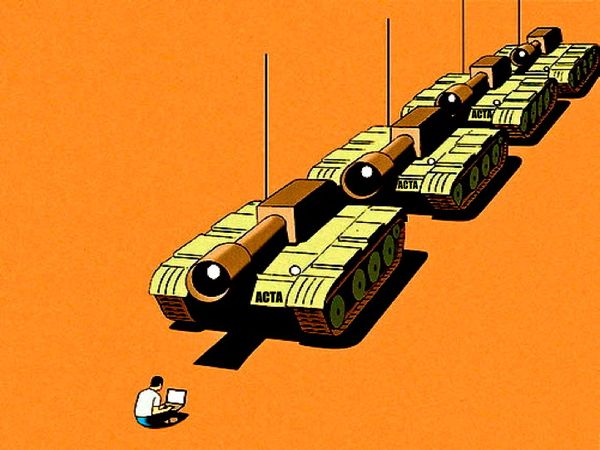14 mars 2010
7
14
/03
/mars
/2010
19:42
The almost unanimous approval of a European Parliament resolution critical of ACTA (http://bit.ly/da3Mso) last Wednesday seems to have taken the EC and some member states by surprise. Now according to our informations they are organizing the counter-attack and the future fight in the EU over the content of the ACTA negotiations is going to be much tougher and more controversial.

It is clear that many of the Members of the European Parliament who usually support some of the IPR objectives of ACTA felt obliged to back the energetic resolution due to the lack of transparency, democratic accountability and due to their notable respect for the growing public campaign all over Europe. The massive ACTA vote in the EP should be understood as of a vote that demanded " more respect for the Parliament!" or "stop negotiating behind our backs" rather than a serious statement about the IP content of the negotiations. At the same time, many MEPs remember very well the massive pressure exercised by Internet activists against "the three strikes" graduated response proposals in the Telecommunications Package and do not want to be seen as weak on fundamental rights issues. Again the mobilization of civil society groups can play a key role in defending the public interest and the freedom and neutrality of Internet services. In the ACTA fight a new very relevant issue is the access to medicine that could be affected seriously by more border seizures and limitations.
In the days leading up to the vote on the ACTA resolution last week in Strasbourg most MEPs received in hand or personally a summary of critical notes http://0z.fr/fSpyU and other data about the process and content of ACTA as part of a continuing campaign coordinated by the TransAtlantic Consumers Dialogue and La Quadrature du Net http://bit.ly/bUEKSR that is aiming to collect before June a majority of MEP signatures needed for approving written declaration 12/2010 that firmly rejects the key elements of both the process and content of ACTA negotiations.
Simultaneously the European Commission is being bombarded by a series of parliamentary written questions from MEPs about ACTA and a number of initiatives demanding information and documents within the EP International Trade Committee. The Civil Liberties Committee is also vigilant and demanding that Commission Redding defends basic rights of citizens.
On the 16th of March there will be a coordination meeting at the initiative of the Green Group in the European Parliament of all the major NGOs across Europe who are working on the ACTA question.
In reaction to the calls for transparency from the EP the European Commission is trying to show openness. On Monday the 22nd of March in Brussels over 350 civil society "stakeholders" have been convened by the Directorate General of Trade of the European Commission. Recent informations have revealed to me that the worldwide anti-ACTA campaign is having an impact on EU officials, a number of which are following closely the highlights of the most well-known blogs and webs. This is a sign of the success of an effective public campaign that has forced the EU out of its bunker and into the open battlefield over the content of this important international agreement.
David Hammerstein
TransAtlantic Consumer Dialogue






